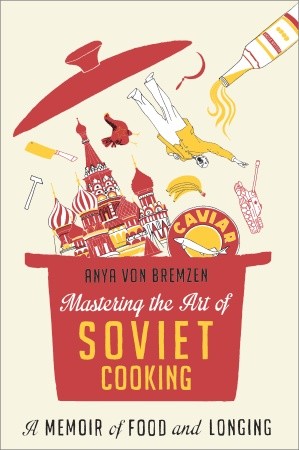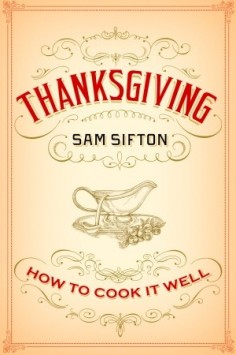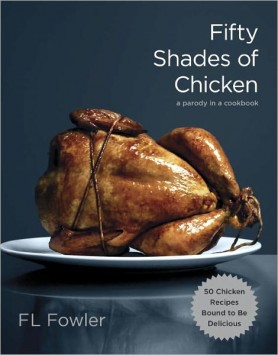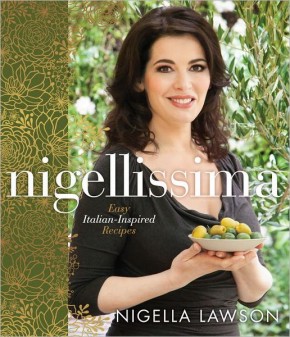Mastering the Art of Soviet CookingA Memoir of Food and Longing
A James Beard Award-winning writer captures life under the Red socialist banner in this wildly inventive, tragicomic memoir of feasts, famines, and three generations.
With startling beauty and sardonic wit, Anya von Bremzen tells an intimate yet epic story of life in that vanished empire known as the USSR—a place where every edible morsel was packed with emotional and political meaning.
Born in 1963, in an era of bread shortages, Anya grew up in a communal Moscow apartment where eighteen families shared one kitchen. She sang odes to Lenin, black-marketeered Juicy Fruit gum at school, watched her father brew moonshine, and, like most Soviet citizens, longed for a taste of the mythical West. It was a life by turns absurd, drab, naively joyous, melancholy—and ultimately intolerable to her anti-Soviet mother, Larisa. When Anya was ten, she and Larisa fled the political repression of Brezhnev-era Russia, arriving in Philadelphia with no winter coats and no right of return.
Now Anya occupies two parallel food universes: one where she writes about four-star restaurants, the other where a taste of humble kolbasa transports her back to her scarlet-blazed socialist past. To bring that past to life, in its full flavor, both bitter and sweet, Anya and Larisa, embark on a journey unlike any other: they decide to eat and cook their way through every decade of the Soviet experience—turning Larisa’s kitchen into a “time machine and an incubator of memories.” Together, mother and daughter re-create meals both modest and sumptuous, featuring a decadent fish pie from the pages of Chekhov, chanakhi (Stalin’s favorite Georgian stew), blini, and more.
Through these meals, Anya tells the gripping story of three Soviet generations—masterfully capturing the strange mix of idealism, cynicism, longing, and terror that defined Soviet life. We meet her grandfather Naum, a glamorous intelligence chief under Stalin, and her grandmother Liza, who made a perilous odyssey to icy, blockaded Leningrad to find Naum during World War II. We meet Anya’s hard-drinking, sarcastic father, Sergei, who cruelly abandons his family shortly after Anya is born; and we are captivated by Larisa, the romantic dreamer who grew up dreading the black public loudspeakers trumpeting the glories of the Five-Year Plan. Their stories unfold against the vast panorama of Soviet history: Lenin’s bloody grain requisitioning, World War II hunger and survival, Stalin’s table manners, Khrushchev’s kitchen debates, Gorbachev’s disastrous anti-alcohol policies. And, ultimately, the collapse of the USSR. And all of it is bound together by Anya’s passionate nostalgia, sly humor, and piercing observations.
Mastering the Art of Soviet Cooking is that rare book that stirs our souls and our senses.
Anya von Bremzen is one of the most accomplished food writers of her generation:the winner of three James Beard awards; a contributing editor at Travel + Leisure magazine; and the author of five acclaimed cookbooks, among them The New Spanish Table, The Greatest Dishes: Around the World in 80 Recipes, and Please to the Table: The Russian Cookbook (coauthored by John Welchman). She also contributes regularly to Food & Wine and Saveur and has written for The New Yorker, Departures, and the Los Angeles Times. She divides her time between New York City and Istanbul.
“Delectable…von Bremzen moves artfully between historical longshots (minefields being cleared ‘by sending troops attacking across them’) and intimate details, like her schoolgirl mother’s lunch ration of podushechka, a candy the size of a fingernail…The descriptions of meals are delightful, despite the anomaly at the heart of her book: during the Soviet period, there was almost nothing decent to eat, unless you were a party official…But von Bremzen makes the best of her material, conjuring the whiff of fermenting sauerkraut in an enameled bucket, the sight of sinews and fat glistening in a cheap goulash ‘with an ivory palette’ and the sharp and creamy taste of the ubiquitous salat Olivier in the ‘kitschy, mayonnaise-happy ‘70s.’”
—New York Times Book Review
“Von Bremzen ladles out a rich, zesty history of family life in the USSR conveyed through food and meals.”
—Entertainment Weekly
“Moving..funny…fascinating…Soul-stirring for any emigrant to read, Mastering the Art of Soviet Cooking is a beautifully written tale of heartbreak and ultimately happiness.”
—Epicurious
“Through a kaleidoscopic mix of family life, politics, history, and jokes, Von Bremzen evokes in her book a whole Soviet-era world of deprivation and delight.”
—Tablet magazine
“The funniest and truest book I’ve read about Russia in years. Ms. von Bremzen had the brilliant idea of transporting us back to the Soviet era of her youth by way of its hilarious, soulful, mayonnaise-laden, doctrinally-approved cuisine. This is both an important book and a delight.”
—Ian Frazier, author of Great Plains and Travels in Siberia
“I don’t think there’s ever been a book quite like this; I couldn’t put it down. Warm, smart and completely engaging, this food-forward journey through Soviet history could only have been written by someone who was there. Part memoir, part cookbook, part social history, this gripping account of Anya von Bremzen’s relationship with the country she fled as a young girl is also an unsentimental, but deeply loving tribute to her mother. Unique and remarkable, this is a book you won’t forget.”
—Ruth Reichl, author of Tender at the Bone and Comfort Me with Apples
“A delicious, intelligent book. When I read it, I can taste the food but also the melancholy, tragedy, and absurdity that went into every bit of pastry and borscht.”
—Gary Shteyngart, author of Super Sad True Love Story
“I have delighted in Anya von Bremzen’s writing for decades. But her prose is at its tangiest, richest, and tastiest in these pages, when she writes about her childhood in the USSR. Mastering the Art of Soviet Cooking is as much a history of Soviet life as it is a personal story. Both narratives are provocative and delicious, and both are worth telling your children.”
—Mario Batali, chef, author, entrepreneur
“Three cheers for Anya Von Bremzen’s poignant, vivid, often hilarious book about trying to survive—and have a square meal—in the last decades of the Soviet Union. The author’s acute political perceptiveness, mordant wit and notable culinary expertise keep the reader delightfully engaged throughout.”
—Francine du Plessix Gray, author of Them: A Memoir of Parents and Soviet Women
“Anya’s description of the saltiness in vobla is as poignant and image-filled as her reflection on a life that started out one way, but ended up in a better place by chance and fate. Her experience of growing up a child of two different worlds tells the beautiful tale of so many American immigrants.”
—Marcus Samuelsson, chef-founder, Red Rooster Harlem, and author of Yes, Chef
“This is much more than a memoir or an extended meditation on food and longing: this is history at its best, accessed through the kitchen door. Written with verve and seasoned with perfect doses of that irony that communist societies excel at cultivating, this book is a rare and delightful treat, as much of a page-turner as the best of novels and as enlightening an introduction to Soviet history as one could ever hope to find. Anya Von Bremzen proves with admirable flair that the adage “you are what you eat” applies not only to individuals and families, but also to entire nations, and that cookbooks may indeed be the most translucent of windows to the soul.”
—Carlos Eire, author of Waiting for Snow in Havana: Confessions of a Cuban Boy
“Mastering the Art of Soviet Cooking is a monumental but deeply human book that reads like a great Russian novel, filled with dark humor and nostalgia. It opens up an entire universe, teaching us about the many deep meanings of food: cultural, political, social, historical, personal.”
—Ferran Adrià, chef-proprietor, El Bulli
“A fascinating, colorful and at times oddly tender look at the history of the former Soviet Union as seen through Anya von Bremzen’s intimate recollections of food–including foods never eaten or never to be sampled again. Von Bremzen does a soulful job of capturing Russians’ ‘complicated and even tortured relationship with food.’ What emerges is her own complicated yet loving relationship to the culture she and her mother willingly left behind, but could never quite abandon.”
—Lucette Lagnado, author of The Man in the White Sharkskin Suit: One Family’s Exodus from Old Cairo to New York
“Anya von Bremzen describes the foods of her past powerfully, poetically, and with a wicked sense of humor. Anyone can make a fancy layer cake sound delicious. To invoke an entire culture and era through an intimate story about a salad or soup–that’s taking food writing to a whole different level.”
—David Chang, chef-founder, Momofuku
“Here’s a surprise: a wry account of how the Soviet Union tasted. Larisa Frumkina, the mother of the author, the daughter of a top military intelligence officer (endlessly, brilliantly resourceful, she appears to come straight out of Russian literature), becomes an émigré, a Pathmark shopper, and a co-conspirator with her daughter in Soviet food nostalgia and self-discovery. A wink, a laugh, a transgression, a sweet sad life over the generations that throws an epic history into a new light.”
—Stephen Kotkin, professor of history, Princeton University; author of Magnetic Mountain: Stalinism as Civilization
“Von Bremzen’s nostalgia for a prickly Soviet childhood brings memories of food both delectable and biting…A lively, precisely detailed cultural chronicle.”
—Kirkus Reviews
“Celebrated food writer Von Bremzen pulls back the curtain on Soviet life in this sweeping, multigenerational memoir.”
—Publishers Weekly
“Most Westerners imagine Stalinist Russia as a food desert…Although this view has plenty of truth, it lacks nuance and humanity, as von Bremzen reveals so eloquently in this memoir…[Von Bremzen] shows the personal side of Soviet life, recounting the terror of war and secret police as well as the power of human resilience. Thanks to some recipes, American home cooks may summon up for themselves the tastes and smells the author evokes.”
—Booklist
In 1970, into the eleventh year of their on-and-off marriage, my parents got back together after a four- year separation and we moved to an apartment in the Arbat. And kulebiaka entered my life. Here, in Moscow’s most aristocratic old neighborhood, I was shooed out of the house to buy the pie in its Soviet incarnation at the take-out store attached to Praga, a restaurant famed “before historical materialism” (that’s ironic Sovietese for “distant past”) for its plate-size rasstegai pies with two fillings: sturgeon and sterlet.
Even in the dog days of Brezhnev, Praga was fairly dripping with klass—a fancy restoran where Misha types groped peroxide blondes while a band blasted, and third- world diplomats hosted receptions in a series of ornate private rooms.
“Car of Angola’s ambassador to the door!”
This was music to my seven- year-old ears.
If I loitered outside Praga intently enough, if my young smile and “Khello, khau yoo laik Moskou?” were sufficiently charming, a friendly diplomat might toss me a five-pack of Juicy Fruit. The next day, in the girls’ bathroom, aided by ruler and penknife, I would sell off the gum, millimeter by millimeter, to favored classmates. Even a chewed-up blob of Juicy Fruit had some value, say a kopek or two, as long as you didn’t masticate more than five times, leaving some of that floral Wrigley magic for the next masticator to savor. Our teacher’s grave warnings that sharing capitalist gum causes syphilis only added to the illegal thrill of it all.
I loved everything about shopping at Praga. Loved skipping over the surges of brown melted snow and sawdust that comrade janitors gleefully swept right over the customers’ feet. Loved inhaling the sig-nature scent of stale pork fat, peregar (hangover breath), and the sickly sweet top notes of Red Moscow perfume. Loved Tyotya Grusha (Aunt Pear), Praga’s potato-nosed saleslady, clacking away on her abacus with savage force. Once, guided by some profound late socialist instinct, I shared with Grusha a five-pack of Juicy Fruit. She snatched it without even a thank- you, but from then on she always made sure to reserve a kulebiaka for me. “Here, you loudmouthed infection,” she’d say, also slipping me a slab of raisin-studded pound cake under the counter.
And this is how I came to appreciate the importance of black marketeering, blat (connections), and bribery. I was now inching my own way toward privilege.
Wearing shiny black rubber galoshes over my valenki (felt boots) and a coat made of “mouse fur” (in the words of my dad), I toted the Pravda-wrapped kulebiaka back to our family table, usually taking the long way home—past onion-domed churches now serving as ware-houses, past gracious cream and green neoclassical facades scrawled with the unprintable slang that Russians call mat. I felt like Moscow belonged to me on those walks; along its frozen streetscape I was a flaneur flush with illicit cash. On Kalinin Prospect, the modernist grand boulevard that dissected the old neighborhood, I’d pull off my mittens in the unbearable cold to count out twenty icy kopeks for the blue-coated lady with her frosty zinc ice cream box. It was almost violent, the shock of pain on my teeth as I sank them into the waffle cup of vanilla plombir with a cream rosette, its concrete-like hardness defying the flat wooden scooping spoon. Left of Praga, the Arbatskaya metrostation rose, star-shaped and maroon and art deco, harboring its squad of clunky gray gazirovka (soda) machines. One kopek for unflavored; three kopeks for a squirt of aromatic thick yellow syrup. Scoring the soda: a matter of anxious uncertainty. Not because soda or syrup ran out, but because alkogoliks were forever stealing the twelve-sided beveled drinking glass—that Soviet domestic icon. If, miraculously, the drunks had left the glass behind, I thrilled in pressing it hard upside down on the machine’s slatted tray to watch the powerful water jet rinse the glass of alcoholic saliva. Who even needed the soda?
Deeper into Old Arbat, at the Konservi store with its friezes of socialist fruit cornucopias, I’d pause for my ritual twelve-kopek glass of sugary birch-tree juice dispensed from conical vintage glass vats with spigots. Then, sucking on a dirty icicle, I’d just wander off on a whim, lost in a delta of narrow side streets that weaved and twisted like braids, each bearing a name of the trade it once supported: Tablecloth Lane, Bread Alley. Back then, before capitalism disfigured Moscow’s old center with billboards and neons and antihistorical historicist mansions, some Arbat streets did retain a certain nineteenth-century purity.
At home I usually found Mom in the kitchen, big black receiverunder her chin, cooking while discussing a new play or a book with a girlfriend. Dad struck a languid Oblomovian pose on the couch, play-ing cards with himself, sipping cold tea from his orange cup with white polka-dots.
“And how was your walk?” Mother always wanted to know. “Did you remember to stop by the house on Povarskaya Street where Natasha from War and Peace lived?” At the mention of Tolstoy, the Juicy Fruit inmy pocket would congeal into a guilty yellow lump on my conscience.Natasha Rostova and my mom—they were so poetic, so gullible. And I? What was I but a crass mini-Misha? Dad usually came to the rescue: “So, let’s have the kulebiaka. Or did Praga run out?” For me, I wanted to reply, Praga never runs out! But it seemed wise not to boast of my special blat with Aunt Grusha, the saleslady, in the presence of my sweet innocent mother.
Eating kulebiaka on Sundays was our nod to a family ritual—even if the pie I’d deposit on the kitchen table of our five-hundred-square-foot two-room apartment shared only the name with the horn of plenty orgiastically celebrated by Gogol and Chekhov. More Bulka (white breadroll) than pirog, late-socialist kulebiaka was a modest rectangle of yeast dough, true to Soviet form concealing a barely there layer of boiled ground meat or cabbage. It now occurs to me that our Sunday kulebiaka from Praga expressed the frugality of our lives as neatly as the grandiose version captured czarist excess. We liked our version just fine. The yeast dough was tasty, especially with Mom’s thin vegetarian borscht, and somehow the whole package was just suggestive enough to inspire feverish fantasies about pre-revolutionary Russian cuisine, so intimately familiar to us from books, and so unattainable.
Dreaming about food, I already knew, was just as rewarding as eating.











Leave a Reply